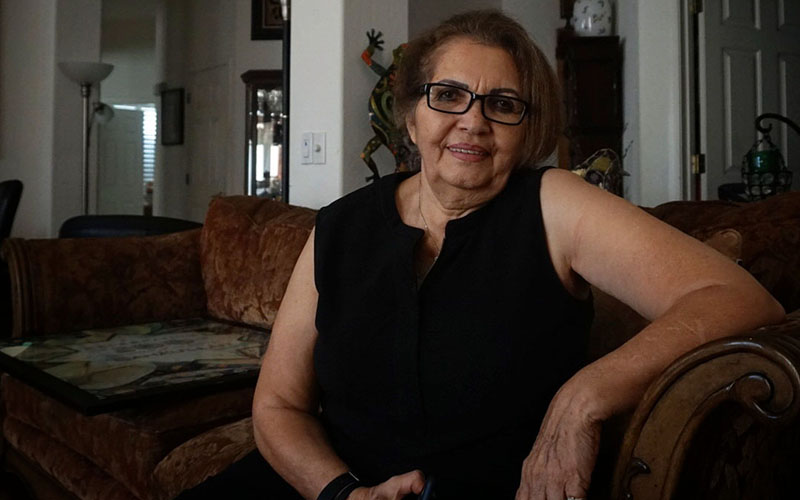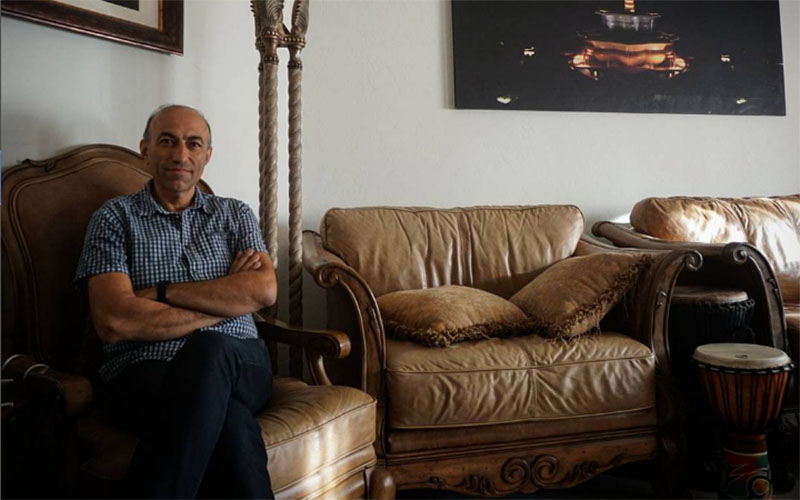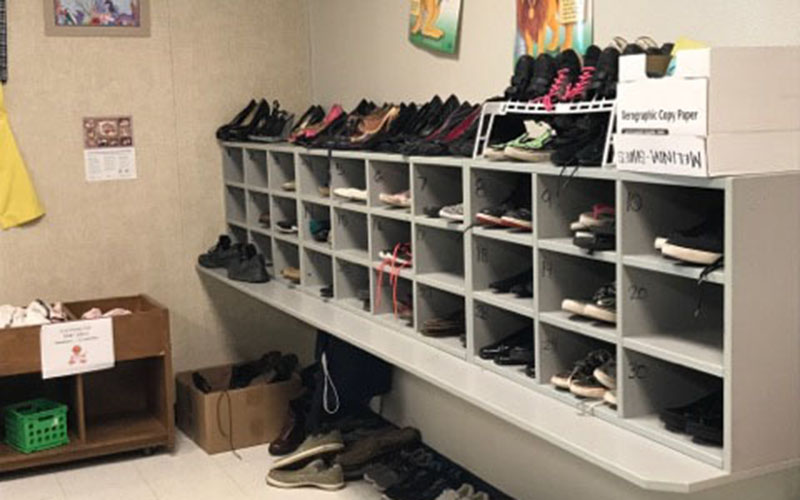
Manijeh Shahidi Clarke of Mesa arrived in the U.S. in 1986 after eluding Iranian authorities.(Photo by Angel Mendoza/Cronkite News)
MESA – Eyes closed and hands clasped, seven followers of the Bahá’í faith worship in Manijeh Shahidi Clarke’s living room, sharing excerpts from the writings of Bahá’u’lláh, who they believe to be a divine messenger of God.
They walk through Shahidi Clarke’s unlocked front door nearly every Saturday to pray. Praying in a house is customary of the Bahá’í faith both in the U.S. and in Iran, said Farzeneh Barati, who was in attendance at the devotional.
But in Shahidi Clarke and Barati’s home country, this worshipping could merit a death sentence. In Iran, they are called “untouchables” and “heretics.” Here in Mesa, they are refugees who fled their country to avoid persecution and execution.
Since 1979, Iranian authorities have killed or executed 200 Bahá’í leaders, according to a 2017 annual report from the United States Commission on International Religious Freedom. At least 10,000 Bahá’is have been dismissed from jobs or higher education and over the past 10 years, nearly 1,000 Bahá’ís have been arrested arbitrarily, according to the same report.
“They came to my house because it was after they arrested all the members of the (Bahá’í) assembly,” said Shahidi Clarke, a 76-year-old refugee who fled from Iran more than 30 years ago.
In 1979, a historic religious uprising resulted in the toppling of a monarchy and the establishment of an Islamic Republic. Those who were not Muslim were routinely excluded from accessing educational resources, opening businesses and publicly practicing their faith, according to the USCIRF.
Nearly 2,000 Iranian refugees have arrived in the U.S. since the start of the uprising, according to the Arizona Department of Economic Security, which oversees the state’s refugee resettlement program. Some refugees who still have family in Iran say they talk on the phone with caution because authorities regularly wiretap phones.
“For me, it happened when I was in middle school,” said Farzaneh Barati, 44, an Iranian refugee who arrived to the states in July 2008 and eventually graduated from Arizona State University with a degree in health sciences.
Barati remembers a time when she was excluded from her middle school cooking class because she was Bahá’í.
“My group went to the teacher and asked her to skip me from the cooking,” Barati said. “The teacher came to me and (said) ‘Farzaneh, don’t cook with them, but I’m going to give you the grade.'”
When she asked why she was being excluded, the teacher told her, “Because you are Bahá’í and you’re untouchable, we can’t give you any task to do cooking,” Barati said. “It affected my heart.”
Today, the Islamic Republic of Iran still recognizes the Shi’a branch of Islam as the official religion of the country. As of 2010, 99.5 percent of all Iranians are Muslim, and a significant majority of them are Shi’a.
Buddhists, Christians, Hindus, Jews and all other religions represent less than one percent of the population, according to Washington D.C.- based Pew Research Center.
Barati said her mother, while pregnant, was beaten for being Bahá’í.
“This is a really serious human rights issue,” said ASU religious studies major and interfaith advocate Johnny Martin, who began attending Tempe Bahá’í community events after he converted to Shi’a Islam.
“I’m shocked that I’ve never heard of this before – never, in the media, on TV, even in the papers … this was something that was not anywhere on my radar,” said Martin.
When Barati was a 15-year-old high school student, she was asked in a written exam whether she was Bahá’í.
“If I sign up for the Bahá’í faith, that means I couldn’t continue my education in that country,” she said. “That means no job, no future, no career.”
Still, she admitted she was Bahá’í, even though her mother advised against it.
“But I had a very strong feeling that this is the right faith … It talked about the unity and peace and kindness, truthfulness – all those qualities made me choose to be a Bahá’í.”
Jalal Mohtashami, 32, an acquaintance of Shahidi Clarke and Barati, holds devotionals and youth group sessions centered on the writings of Bahá’u’lláh. While not a refugee, he said Bahá’ís face a “double-binded” pressure when deciding whether or not to declare their faith in Iran.
“It’s an interesting struggle because then if someone says they’re not a Bahá’í but they have people around them who are known Bahá’í, then the government immediately pressures them to spy on their friends and family so it’s not as easy an out as is offered,” Mohtashami said.
Shahidi Clarke escaped Iran in 1985 and came to America in 1986, one of 52 refugees who fled from Iran that year, according to the Arizona Department of Economic Security.
“They want to kill me and I escaped Iran,” she said. “They came to my house because it was after they arrested all the members of the (Bahá’í) assembly.”
She was fired from her job as a high school teacher. To make a living, she took up knitting.
“My father bought an apartment for us, and I started working with knitting and then that was my career,” she said. “I took orders from the people, I made dresses, or sweaters, anything.”
Today, she still has a green knitted sweater and cap that she made during her time in Iran. She made enough money over three years to hire someone to take her and her family to Pakistan by motorcycle across a rough terrain.
“All day. Boom, boom … big rocks, and it was so bad,” she said. “In the middle of this all, we didn’t have any water, (and) when we get to Pakistan, it was a very dirty area – everywhere.”
Their dilapidated apartment had no electricity and food was scarce; their fruit was rotten, their meat black.
“I had such a such a bad life. I was skinny, like 110 pounds,” Shahidi Clarke said. “Every day, six, seven hours I was crying, because first of all, I didn’t have my children with me.”
She sent her then- 9-year-old daughter to India so she could go to school, she said.
“For seven years I didn’t see her,” she said. “And then she graduated from high school and she came to the United States and my son, three years before us, came to the United States.”
Shahidi Clarke’s arrival to the U.S. in the summer of 1986 was one of bittersweet relief.
Emaciated and exhausted, she said at the time she looked “older than right now.”
Her son, Kaveh Shahidi, escaped through mountains in Kurdistan and made it to the U.S. as an Iranian refugee three years before his mother.
“It took about seven days walking at night, just only where there’s no light, being hidden in the truck with fruits in them … (and) sleeping on the rocks in the mountains of Kurdistan,” he said. “So, it was a difficult journey, it was a perilous journey.”

Kaveh Shahidi, 51, fled through the mountains of Kurdistan. When Iranian authorities found out he was Bahá’í, he was persecuted. He now lives in Mesa. (Photo by Angel Mendoza/Cronkite News)
“I suspect all refugees go through that … the struggle of life and survival,” he added.
In Arizona, there are over 140 Bahá’í communities, according to the Bahá’ís of the United States official website.
“Bahá’ís are the followers of Christ. We’re the followers of Buddha. We’re followers of Muhammad,” he said. “So, for us it’s very natural to include these sources. But it’s always offered in a way that respects the culture and background of those who are participating and never offered in a way of motive proselytization.”
Though ASU’s Martin is a Shi’a Muslim, decades of documented hatred and oppression toward Bahá’ís in Iran has had no effect on his relationship with refugees in the Tempe Bahá’í community.
“By my faith identity, I am part of the group that is their oppressor,” Martin said. “(But) the Bahá’ís that I’ve met in Phoenix – many of whom are refugees or are connected to refugee communities – have shown me that me being Shi’a Muslim doesn’t in any way make them feel anger or hatred or mistrust towards me.”
Kaveh Shahidi said even granting an interview for this story could have been “life-threatening” in Iran. He is grateful for the degree of religious freedom his family has found in the U.S.
“In spite of it all, people do it,” he said. “And that to me, that means people are believing in something.”
Barati said she continues to pray for change.
“But I prayed, everyone prayed that maybe somehow, someday the (rules) get changed and give us an opportunity to continue our education, or at least work for the government or have free speech to talk about who we are,” she said.
But one member of the Tempe Bahá’í community will soon visit her family in Iran and continues to fear for their safety.
Mana, an Iranian refugee who declined to give her last name because her sister is still in Iran, came to the U.S. in 2004 and said she was also once treated as an “untouchable.”
“I stayed somewhere in the corner, or they don’t touch me,” she said.
“After I graduated from high school, I was depressed because I couldn’t go to university,” she wrote in an email. “One day I decided to follow my dreams and I made my greatest decision in my life to leave all of my belongings that I loved.”
